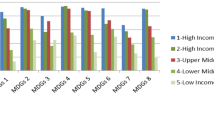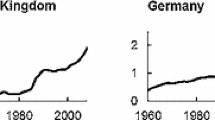Abstract
Since its introduction in the first Human Development Report in 1990, the Human Development Index (HDI) has attracted great interest in policy and academic circles, as well as in the media and national audiences around the world. Its popularity can be attributed to the simplicity of its characterization of development - an average of achievements in health, education and income – and to its underlying message that development is much more than economic growth. The index was originally conceived by the late Pakistani economist Mahbub ul Haq, in collaboration with Amartya Sen and other scholars, as a response to their dissatisfaction with GDP as the standard measure of development. As Haq noted, “Any measure that values a gun several hundred times more than a bottle of milk is bound to raise serious questions about its relevance for human progress.” Yet the HDI’s very simplicity prompted critiques from the start, with some contending that it was too simplistic, while others who accepted its self-imposed limitations still questioned its choice of indicators and its computational methodology. This article discusses the concept and key insights learnt from the HDI, provides a detailed review of key critiques of the HDI, today and in the past, and explains the recent changes introduced to the HDI formula and indicators. Recent controversies are highlighted and placed in the context of longer running debates. The innovations to broaden the measurement of deprivations and disparities in human development are introduced, with some key global and regional insights.
Similar content being viewed by others
References
Alkire, S., Foster, J.: Designing the Inequality-Adjusted Human Development Index (HDI). Human Development Research Paper 28. UNDP-HDRO, New York (2010)
Alkire, S., Santos, M.: Acute Multidimensional Poverty: A New Index for Developing Countries. Human Development Research Paper 11. UNDP-HDRO, New York (2010)
Anand, S., Sen, A.: Human Development Index: Methodology and Measurement. Background paper for Human Development Report 1993. UNDP-HDRO, New York (1992)
Anand, S., Sen, A.: Gender Inequality in Human Development: Theories and Measurement. Human Development Report Office Occasional Paper 19. UNDP-HDRO, New York (1995)
Anand, S., Sen, A.: Concepts of Human Development and Poverty: A Multidimensional Perspective. In: Human Development Papers 1997: Poverty and Human Development: 1–19. UNDP-HDRO, New York (1997)
Anand, S., Sen, A.: The income component of the human development index. J. Hum. Dev. 1(1), 83–106 (2000)
Atkinson, A.B.: On the measurement of inequality. J. Econ. Theory 2, 244–263 (1970)
Bairoch, P.: Economics and World History: Myths and Paradoxes. University of Chicago Press, Chicago (1993)
Barro, R.J.: Economic growth in a cross section of countries. Q. J. Econ. 106(2), 407–443 (1991)
Barro, R.J., Lee, J.W.: International comparisons of educational attainment. J. Monetary Econ. 32, 363–394 (1993)
Barro, R.J., Lee, J.W.: International measures of schooling years and schooling quality. Am. Econ. Rev. 86, 218–223 (1996)
Barro, R.J., Lee, J.W.: International data on educational attainment: updates and implications. Oxf. Econ. Pap. 3, 541–563 (2001)
Barro, R.J., Lee, J.W.: A New Data Set of Educational Attainment in the World, 1950–2010. NBER Working Paper No. 15902. National Bureau of Economic Research, Massachusetts (2010)
Barro, R.J., Sala-i-Martin, X.: Economic Growth, 2nd edn. The MIT Press, Cambridge (2003)
Becker, G.S., Philipson, T.J., Soares, R.R.: The quantity and quality of life and the evolution of world inequality. Am. Econ. Rev. 95(1), 277–291 (2005)
Bosworth, B., Collins, S.: The empirics of growth: an update. Brookings Pap. Econ. Activ. 4, 136–147 (2003)
Brandolini, A: On Applying Synthetic Indices of Multidimensional Well-being: Health and Income Inequalities in Selected EU Countries. Temi di discussion (Economic working papers) 668. Economic Research Department, Bank of Italy (2007)
Cahill, M.: Is the human development index redundant? East. Econ. J. 31(1), 12–19 (2005)
Chakravarty, S.R.: A generalized human development index. Rev. Dev. Econ. 7(1), 99–114 (2003)
Chatterjee, S.K.: Measurement of human development—an alternative approach. J. Hum. Dev. 6(1), 31–53 (2005)
Dasgupta, P., Weale, M.: On measuring the quality of life. World Dev. 20(1), 119–131 (1992)
Decancq, K., Decoster, A., Schokkaert, E.: The Evolution in World Inequality in Well-being. Discussion Paper Series 07/04. Center for Economic Studies, Katholieke Universiteit Leuven (2007)
Desai, M.J.: Human development: concepts and measurement. Eur. Econ. Rev. 35(2/3), 350–357 (1991)
Durlauf, S., Johnson, P., Temple, J.: Growth econometrics. In: Aghion, P., Durlauf, S. (eds.) Handbook of Economic Growth, vol. 1, part A, chapter 8, pp. 555–677. Amsterdam (2005)
Easterly, B., Freschi, L.: The First Law of Development Stats: Whatever our Bizarre Methodology, We make Africa look Worse. Retrieved from http://aidwatchers.com/2010/12/the-first-law-of-development-stats-whatever-our-bizarre-methodology-we-make-africa-look-worse/ (2010)
Foster, J.E., Lopez-Calva, L.F., Szekely, M.: Measuring distribution of human development: methodology and an application to Mexico. J. Hum. Dev. 6(1), 5–25 (2005)
Gaertner, W., Xu, Y.: Capability sets as the basis of a new measure of human development. J. Hum. Dev. 7(3), 311–321 (2006)
García, C., Kovacevic, M.: Uncertainty and Sensitivity Analysis of the Human Development Index. Human Development Research Paper 47. UNDP-HDRO, New York (2011)
Gaye, A., Klugman, J., Kovacevic, M., Twigg, S., Zambrano, E.: Measuring Key Disparities in Human Development: the Gender Inequality Index. Human Development Research Paper 46. UNDP-HDRO, New York (2010)
Gertner, J.: The Rise and Fall of the G.D.P. The New York Times. May 13 (2010)
Hawken, A., Munck, G.: Cross-National Indices with Gender-Differentiated Data: What Do They Measure? How Valid Are They? Technical Background Paper for the forthcoming UNDP Asia Pacific Human Development Report on Gender. United Nations Development Programme, New York (2009)
Herrero, C., Martínez, R., Villar, A.: A Multiplicative Human Development Index. Working Paper, Fundación BBVA/BBVA Foundation (2005)
Herrero, C., Martínez, R., Villar, A.: Improving the Measurement of Human Development. Human Development Research Paper 12. UNDP-HDRO, New York (2010)
Ibrahim, S., Alkire, S.: Agency and empowerment: a proposal for internationally comparable indicators. Oxf. Dev. Stud. 35, 379–403 (2007)
Kabeer, N.: Resources, agency, achievement: reflections on the measurement of women’s empowerment. Dev. Change 30(3), 435–464 (1999)
Klasen, S., Schüler, D.: Reforming the Gender-Related Development Index (GDI) and the Gender Empowerment Measure (GEM): Implementing Some Specific Proposals. IAI Discussion Paper 186. Ibero America Institute for Economic Research, Göttingen, Germany (2010)
Klasen, S., Nguefack, G., Zucchini, W.: On weighting the components of the human development index: a statistical justification. J. Hum. Dev. Capabilities 12(2), (2012)
Kovacevic, M.: Review of HDI Critiques and Potential Improvements. Human Development Research Paper 33. UNDP-HDRO, New York (2010)
Leontief, W.W.: Quantitative input and output relations in the economic systems of the United States. Rev. Econ. Stat. 18(3), 105–125 (1936)
Maddison, A.: Historical Statistics of the World Economy: 1–2008 AD. Organisation for Economic Cooperation and Development, Paris (2010)
McGillivray, M.: The human development index: yet another redundant composite development indicator? World Dev. 19(10), 1461–1468 (1991)
Narayan, D.: Measuring Empowerment: Cross-Disciplinary Perspectives. World Bank, Washington, DC (2005)
Nathan, H.S.K., Mishra, S., Reddy, B. S.: An Alternative Approach to Measure HDI. IGIDR Working Paper WP-2008-002 (2008)
Neumayer, E.: Weak versus Strong Sustainability—Exploring the Limits of Two Opposing Paradigms. Elgar, Cheltenham (1999)
Neumayer, E.: Human Development and Sustainability. Human Development Research Paper 5. UNDP-HDRO, New York (2010)
Noorbakhsh, F.: The human development index: some technical issues and alternative indices. J. Int. Dev. 10(5), 589–605 (1998)
Nussbaum, M.: Women and Human Development: the Capabilities Approach. Cambridge University Press, Cambridge (2000)
Nussbaum, M.: Frontiers of Justice. Belnap/Harvard University Press, Cambridge (2006)
Palazzi, P., Lauri, A.: The human development index: suggested corrections. Banca Nazionale Lav. Q. Rev. 51(205), 193–221 (1998)
Ravallion, M.: Good and bad growth: the human development reports. World Dev. 25(5), 631–638 (1997)
Ravallion, M.: Mashup Indices of Development. Policy Research Working Paper 5432. World Bank, Washington DC (2010)
Ravallion, M.: Troubling Tradeoffs in the Human development Index. Policy Research Working Paper 5484. World Bank, Washington DC (2010)
Riley, J.C.: Poverty and Life Expectancy. Cambridge University Press, Cambridge (2005)
Robeyns, I.: The capability approach: a theoretical survey. J. Hum. Dev. Capabilities 6(1), 93–114 (2005)
Rodríguez, F.: The anarchy of numbers: understanding the evidence on Venezuelan economic growth. Can. J. Dev. Stud. 27(4), 503–529 (2006)
Rodríguez, F.: What the New HDI Tells Us about Africa. Retrieved from http://hdr.undp.org/en/humandev/lets-talk-hd/2010-12a/ (2010)
Rodríguez, F.: Interpreting Trade-offs in the HDI: A Response to the Critique of World Bank Economist Martin Ravallion. Retrieved from http://hdr.undp.org/en/humandev/lets-talk-hd/2010-12c/ (2010)
Rodrik, D.: The Unsung Development Miracles of Our Time. Retrieved from http://rodrik.typepad.com/dani_rodriks_weblog/2010/11/the-unsung-development-miracles-of-our-time.html (2010)
Sagar, A.D., Najam, A.: The human development index: a critical review. Ecol. Econ. 25(3), 249–264 (1998)
Scanlon, T.M.: What We Owe to Each Other. Harvard University Press, Cambridge (1999)
Seth, S.: A Class of Association Sensitive Multidimensional Welfare Indices. OPHI Working Paper No. 27, Oxford Department of International Development, University of Oxford, UK (2009)
Sen, A.: Commodities and Capabilities. Elsevier, Amsterdam (1985)
Sen, A.: Development as Freedom. Oxford University Press, Oxford (1999)
Sen, A.: Rationality and Freedom. Harvard University Press, Cambridge (2002)
Sen, A.: Forward. In: Fukuda-Parr, S., Shiva Kumar, A.K. (eds.) Readings in Human Development, Concepts, Measures and Policies for a Development Paradigm. Oxford University Press, New York (2003)
Sen, A.: The economics of happiness and capability. In: Bruni, L., Comim, F., Pugno, M. (eds.) Capabilities and Happiness, pp. 16–27. Oxford University Press, Oxford (2008)
Sen, A.: The Idea of Justice. The Belknap Press of Harvard University Press, Cambridge (2009)
Sen, G., Batliwala, S.: Empowering women for reproductive rights. In: Presser, H.B., Sen, G. (eds.) Women’s Empowerment and Demographic Processes: Moving Beyond Cairo, pp. 15–36. Oxford University Press, Oxford (2000)
Srinivasan, T.N.: Human development: a new paradigm or a reinvention of the wheel? Am. Econ. Rev. 84(2), 238–243 (1994)
Stiglitz, J.E., Sen, A., Fitoussi, J.: Report by the Commission on the Measurement of Economic Performance and Social Progress. Commission on the Measurement of Economic Performance and Social Progress, Paris (2009)
ul Haq, M.: Reflections on Human Development. Oxford University Press, New York (1995)
UNDESA-PD (United Nations Department of Economic and Social Affairs, Population Division): World Population Prospects: The 2008 Revision Population Database. New York (2009)
UNDP (United Nations Development Programme)–Human Development Report Office. 1990, 1991, 1993, 1995, 2009, 2010. Human Development Reports 1990, 1991, 1993, 1995, 2009, 2010. New York: Oxford University Press through 2005; and Palgrave Macmillan since 2006
UNESCO Institute for Statistics: School-Life Expectancy. Retrieved from http://www.uis.unesco.org/i_pages/indspec/tecspe_sle.htm (2011)
Wagstaff, A.: Whither the Development Agency’s Flagship Report? Retrieved from http://blogs.worldbank.org/developmenttalk/whither-the-development-agency-s-flagship-report (2011)
Williamson, J.: What Washington means by policy reform. In: Williamson, J. (ed.) Latin American Adjustment: How Much has Happened. Peterson Institute for International Economics, Washington, DC (1990)
Wolff, H., Chong, H., Auffhammer, M.: Classification, Detection and Consequences of Data Error: Evidence from the Human Development Index. NBER Working Paper Series (2010)
World Bank: World Development Report 2000/2001: Attacking Poverty. Oxford University Press, New York (2000)
World Bank: Where is the Wealth of Nations? Washington, DC (2006)
World Bank: World Development Indicators 2010. Washington, DC (2010)
Zambrano, E.: Functionings, Capabilities and the 2010 Human Development Index. Manuscript (2011)
Zambrano, E.: Measuring HDI Measurements: Why the New Model Works Best. Retrieved from http://hdr.undp.org/en/humandev/lets-talk-hd/ (2011)
Author information
Authors and Affiliations
Corresponding author
Rights and permissions
About this article
Cite this article
Klugman, J., Rodríguez, F. & Choi, HJ. The HDI 2010: new controversies, old critiques. J Econ Inequal 9, 249–288 (2011). https://doi.org/10.1007/s10888-011-9178-z
Received:
Accepted:
Published:
Issue Date:
DOI: https://doi.org/10.1007/s10888-011-9178-z




